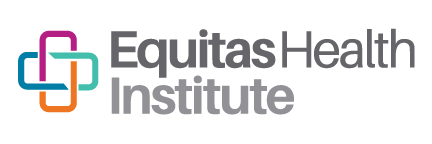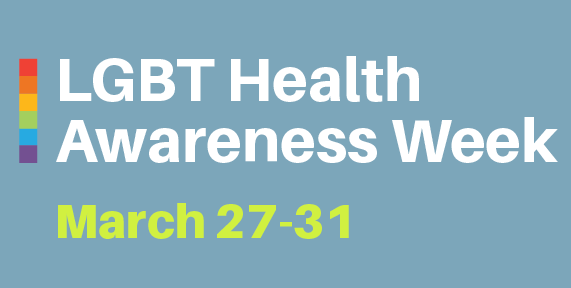2019 LGBT Health Awareness Week
2019 LGBT Health Awareness Week
By Ramona Peel, Lead Trainer
This is LGBT Health Awareness Week, and the staff of the Institute would like to tell you about the health and wellness challenges facing this community, and what we are doing to try to improve health outcomes for LGBTQ+ folks in Ohio and beyond.
First of all, it’s important to note the growth of the LGBTQ+ (Lesbian, Gay, Bisexual, Transgender, Queer/Questioning, Intersex, Asexual/Aromantic, Pansexual, and more) community. A 2018 Gallup poll showed that the percentage of the US population that asserts an LGBTQ+ identity grew from 3.5 % in 2012 to 4.5%. Here in Ohio, 4.3% of the state’s adult population is LGBTQ+ (about 391,000 individuals), a larger number of people than the combined populations of Dayton and Akron. Given the relative lack of comprehensive studies focused on the LGBTQ+ community, as well as issues related to sampling methods used by those that do ask about sexual orientation and/or gender identity, these numbers likely understate the size of this population. The same Gallup study shows that those born between 1980 and 1998 account for the majority of this growth.
Given that millennials will outpace baby boomers as the largest generational cohort in the US in 2019, and that younger age cohorts are even more likely to be LGBTQ+, it’s clear that this population will be driving greater demand for health and wellness services in the coming decades. The LGBTQ+ community has grown and is growing, due to culture change and an increase in climates where it is safe to be out, improved measures for accurately counting the LGBTQ+ population, and wider acceptance of the fluidity of gender and sexuality.
This growing community suffers from a range of significant health disparities and inequities. According to the National LGBT Health Education Center, LGBT individuals use tobacco at double the rate of the general US population. In addition, this community experiences elevated rates of mental health issues, including depression, anxiety, post-traumatic stress, and suicidal ideation. Rates of substance use and abuse are above average for LGBT Americans as well. These disparities are strongly (though not exclusively) driven by minority stress. LGBTQ+ people face significant prejudice from both individuals and institutions, and there are no broad statewide protections against discrimination on the basis of sexual orientation or gender identity in Ohio, or in most other US states.
Even though this population has an above-average need for health and wellness services, they are less likely that the rest of the population to be linked to care. In part, this is because LGBTQ+ people face additional barriers to care: The Williams Institute at UCLAhas found that LGBT Ohioans face higher unemployment rates, are more likely to live in poverty, and are less likely to be insured than other Ohio residents. Even when they can access care, those services are far-too-often delivered alongside discrimination and harassment.
According to a study conducted by Lambda Legal, over 50% of LGBTQ+ respondents reported experiencing at least one of the following types of discrimination:
- being refused needed care
- health care professionals refusing to touch them or using excessive precautions
- health care professionals using harsh or abusive language
- being blamed for their health status
- health care professionals being physically rough or abusive.
These percentages were even higher for transgender respondents and people of color included in the study.
Ohio is no exception to these national trends. In 2015, the National Center for Transgender Equality conducted a survey that included over 900 trans Ohioans, and found that 26% avoided going to a doctor because of fear of discrimination. Further, 32% reported at least one negative experience in a health care setting related to their gender identity. The loss of linkage to care is the most damaging result of discrimination in health care settings. This reluctance to see health care providers exacerbates health disparities and contributes to worsening health outcomes over time.
The Institute is attacking these problems through two primary approaches: Provider education and patient empowerment.
Through our provider education program, we directly train leadership and staff at health and wellness providers across Ohio and beyond, giving them both a theoretical background on the basics about this community, as well as tangible best practices they can implement to create more welcoming, safe, affirming, and inclusive environments for LGBTQ+ folks.
One area of emphasis is structural competency, or the impact that the physical environment of a clinic can have on patient engagement and outcomes. Small changes in a clinic environment can make a big difference, such as including symbols of inclusiveness like the rainbow Pride flag. Another important step is changing the way you ask questions on intake forms to make them more inclusive for everyone regardless of sexual orientation or gender identity (SOGI). Changing the signage on your single-occupancy restrooms to “all gender” or “gender neutral,” and training your staff to introduce themselves with their names and pronouns also helps create a more affirming and inclusive environment. Patients who feel welcomed and affirmed are more likely to be honest and transparent with their providers, to stay linked to care, and to remain loyal to specific providers (while also spreading positive word of mouth marketing).
The Equitas Health Institute is committed to educating providers on how to achieve cultural humility. Our trainers have decades of accumulated experience and bring insights from their own lived experiences being LGBTQ+ into training environments. Training can be delivered across the state on a wide variety of topics and tailored to providers’ needs. In addition, we are certified providers of continuing education credits across a variety of disciplines. However, that’s not the only way the Institute is fighting these health inequities – We also are working hard to empower patients.
Through our Patient Empowerment Workshops, we inform community members about their rights as patients, and give them tips on how to be properly prepared for an appointment. In addition, we also provide advice on basic coping strategies including mindfulness techniques, emotional regulation practices, and assertive communication skills.
We are also holding community events throughout the state to spread the message that, when it comes to HIV, Undetectable = Untransmittable (U=U). It is crucially important that providers and community members know that people living with HIV who are adherent to their medication regimens are able to reach a point where the concentration of HIV in their system is so infinitesimal that they cannot transmit the virus to others via sexual contact. Spreading this message is a big part of our push to make this the last era of HIV.
If you’re interested in learning more about our training and provider education programs, please contact Education Manager Zoe Freggens at zoefreggens@equitashealth.com. If you’d like to know more about our Patient Empowerment Workshops, U=U education, or our other community engagement initiatives, please contact Community Engagement Manager Dom Ali at dominicali@equitashealth.com.
Disclaimer: For the purposes of this blog post, we (the Institute) use the acronym LGBTQ+, however if/when it is not used below, it is in an attempt to accurately reflect the source material we are citing.

